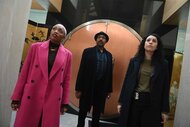Create a free profile to get unlimited access to exclusive show news, updates, and more!
So, What Does "the Cocktail Party Effect" Mean? Defining the Science on Irrational
We keep track of the definitions of every scientific term Alec Mercer uses in NBC's new procedural, The Irrational.
Not to be confused with Bill Nye, Alec Mercer is the (behavioral) science guy. Rationality, decision-making and of course, behavior, are at the heart of NBC’s new drama The Irrational, starring Jesse L. Martin as Mercer.
He's a professor who uses his expertise to help law enforcement when called upon. And as an expert in behavioral science, he throws around many terms on The Irrational each episode, and a majority are based in fact. Here’s a deeper look at the buzzwords heard on the drama.
What did these words mean in The Irrational Episode 2, "Dead Woman Walking"?
The Power of Free
While attempting to lure the episode’s suspect Yuri out from hiding, Alec’s research assistant Rizwan (Arash DeMaxi) suggests they use The Power of Free to call him with an offer of a complimentary vacation.
“In your books you say people can’t resist free items,” Rizwan says.
This term refers to the phenomenon of people's natural inclination to change their behavioral patterns when something is available at no cost. When something is offered with no monetary value, it often triggers an emotional reaction.
Inattentional Blindness
How many times have you been so hyper focused on the task in front of you that you don’t notice what’s going on around you? That’s exactly what inattentional blindness is, and we see it displayed during “Dead Woman Walking” when Alex explains how the culprit was able to poison C.J. in a public crowded space (basically right in front of her face) without her knowing.
According to the American Psychological Association (APA), the term “entered the psychology lexicon” due to the 1998 research of psychologists Arien Mack and Irvin Rock. The APA says, “increasingly, studies of visual perception have demonstrated how startlingly little people see when we're not paying attention, a phenomenon known as inattentional blindness."
Misdirected Attention
When further explaining how C.J. was poisoned in the restaurant, Alec realizes the culprit used misdirected attention by further distracting her with an event that had no real importance: the public proposal.
As Alex says, magicians often use misdirection to successfully pull off their illusions. A 2011 article from The Frontiers in Human Neuroscience explains, “Misdirection refers to the magician’s ability to manipulate people’s attention, thoughts, and memory. It has been argued that some of the techniques used by magicians to orchestrate people’s attention and awareness may provide valuable insights into human cognition.”
Fake interview
In order to figure out where the poisoner received polonium-210, Alec sets up a fake interview with the suspected provider of the poison, in turn getting the exact information he needed.
“It’s practically an invitation to boast,” he explains to Rizwan. “To overshare a bit, to use one’s medal as an employee. Even if that means admitting to breaking the rules.”
Fake interviews are a deceptive interrogation technique used to give the subject a false sense of comfort so that their guard is down, and they reveal more information. A form of this phenomenon is widely used by U.S. law enforcement and is known as the Reid Technique.
“The Reid Technique involves three components – factual analysis, interviewing, and interrogation,” explains the Connecticut General Assembly (CGA).
However, the method has earned criticism from academics and psychologists, with many claiming it leads to false confessions.
“Some critics contend that the Reid Technique is premised on certain assumptions about human behavior that are not supported by empirical evidence, and that the technique may lead to false confessions. [John E. Reid and Associates, Inc.] contends that critics mischaracterize the Reid Technique and that false confessions are caused by interrogators applying inappropriate methods not endorsed by the company.”
John E. Reid and Associates, Inc. also has a page on their site titled “Critics Corner” which addresses many of the method’s criticisms.
What did these words mean in Irrational Episode 1, "Pilot"?
Paradoxical persuasion
In the opening scenes of the series premiere, Alec is at a hostage negotiation with the FBI, and speaks to the perpetrator. He presented him with a series of choices: Does he want a helicopter? What kind? Where should the helicopter land? What should be done with the baby that’s a hostage? Once he's done with the questions, the hostage-taker gave up his gun and surrendered.
RELATED: How to Tell If Someone Is Lying, Just Like Jesse L. Martin in The Irrational
“I overly embraced his idea to force him to think it through enough to realize it was a terrible idea,” Mercer said to Marisa — an FBI agent who also happens to be his ex-wife — played by Maahra Hill.
Although Mercer called the technique paradoxical persuasion, it can go by many other names, including paradox of choice, and choice overload, according to The Decision Lab. They describe it as, “the tendency for people to get overwhelmed when they are presented with a large number of options.”
Cocktail party effect
Later in the series premiere, Mercer and one of his research assistants, Rizwan (Arash DeMaxi) attend an Alcoholics Anonymous meeting as part of a murder investigation. When Rizwan asked how they were going to get AA members to talk to them, Mercer told him they were going to use the cocktail party effect.
“You’re in a crowd, talking to one person—everything else becomes background noise until you hear something like your name, or the word ‘fire,’ or ‘sex,’” Mercer said. “In this case, we’re going to say the name ‘Dylan’ a few times… and if Dylan’s friends are here, they’ll come over and talk to us and we’ll get some clues.”
The cocktail party effect is a known science phenomenon and has been heavily studied. It was originally traced to air traffic controllers in the early 1950s as they tried to single out voices in the control tower, according to research from 1992 MIT research.
The identifiable victim effect
Alec is facing personal struggles on The Irrational, including an upcoming parole hearing for an accused bomber in which he was the only survivor of the tragic accident. He decides to attend the parole hearing for one reason: The identifiable victim effect. This is another well-known and well-studied term.
RELATED: What Jesse L. Martin’s Costars Say About Working With Him
“It is widely believed that people are willing to expend greater resources to save the lives of identifiable victims than to save equal numbers of unidentified or statistical victims,” according to a paper from researchers at Carnegie Mellon.
In other words, putting a face to a situation helps make it more tangible.
“I have to [go to the hearing],” Mercer said in the series premiere. “My injuries could sway the parole board. It’s the identifiable victim effect. I am the only one that can be there. I owe it to the others who can’t.”
Reciprocity
The idea of reciprocity also comes up in the premiere episode, when Rizwan defines the term for Mercer as when, “someone shares something intimate or private, you feel a strong obligation to share back."
The American Psychological Association describes it the same way.
“Reciprocity is a very strong instinct,” Mercer said in the episode. “Programs like AA depend on this concept whether they know it or not.”
Originally published Sep 25, 2023.

























